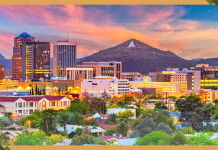Written by: Kimberly White
Companies, cities, investors, and civil society have joined together in pursuit of a resilient, zero carbon recovery.
Led by the UNFCCC’s Champions for Climate Action, the Race to Zero campaign aims to mobilize leadership and drive support for a resilient, zero carbon recovery following the COVID-19 pandemic.
“Like never before, the world has gathered around one goal: the race to zero deaths from COVID-19. A healthy recovery from this pandemic means we need to continue and expand this race to zero deaths from climate change and environmental pollution, a race to zero people pushed into poverty because of health costs, to zero people breathing polluted air,” said Dr. Maria Neira, Director of Environment, Climate Change, and Health at the World Health Organization. “If we want to recover from COVID-19, we all need to embark on a Race to Zero emissions.”
The unprecedented alliance joins 120 countries and comprises nearly 1,000 businesses, 449 cities, 21 regions, 505 universities, and 38 investors. These actors collectively cover approximately 25 percent of global carbon dioxide emissions and more than 50 percent GDP. The listed companies have a combined annual revenue of $4.72 trillion.
All signatories are committed to achieving net zero carbon emissions by no later than 2050 and will report progress each year. Participants are required to submit their plans ahead of COP26 and set interim targets in the next decade. Signatories’ net zero plans are expected to become stronger and more concrete as action toward net zero accelerates.
“Race to Zero must help spur strong enhanced national climate action plans—or NDCs—due this year. Race to Zero is both a campaign for the future and today. That’s why all members are demonstrating how they’re already in the race to zero, by publishing immediate plans by COP26 and setting interim targets in 2025 and 2030,” said Patricia Espinosa, UNFCCC Executive Secretary.
To aid companies striving to achieve net zero emissions, the World Business Council for Sustainable Development (WBCSD) has launched SOS 1.5, a cross-sectorial framework designed to guide companies through transforming their operations and align with the 1.5°C goal.
“To protect the employees, customers and the societies they serve and do no harm, business must act now – at scale—to accelerate the transition to a net-zero economy where economic growth is decoupled from carbon and more than nine billion people are able to live well, within the limits of the planet by no later than 2050,” said María Mendiluce, Managing Director, Climate & Energy, WBCSD. “It’s more important than ever that business starts to invest and deploy their solutions, especially now in an economic recession from COVID-19.”
The net zero goal isn’t only for large corporations. Small and medium-sized enterprises (SMEs) are also invited to participate in the Race to Zero. The International Chamber of Commerce (ICC) and the Exponential Roadmap Initiative teamed up to create a new platform to assist SMEs in their journey to net zero emissions. The SME Exponential Race to Zero provides the International Chamber of Commerce’s 45 million SMEs with “concrete climate action tools and the financial resources necessary to set and achieve climate targets aligned with the ambition of limiting global warming to 1.5°C and thrive in a post-COVID-19 world.”
“The SME Exponential Race to Zero initiative comes at a critical time to help support SMEs become more resilient and recover better from the health and socio-economic effects of COVID-19. Ultimately, climate issues are business issues and this initiative helps SMEs, who comprise the vast majority of businesses worldwide, make the business decisions that will improve earnings, market share and avoid economic repercussions of future existential threats”, said Nigel Topping, UK High-Level Climate Champion.
The alliance adds its voice to a growing call for governments to not return to “business as usual” and instead commit to a fair and just green recovery.
In May, mayors from around the globe pledged to “build a better, more sustainable and fairer society out of the recovery” from the coronavirus pandemic. C40’s Global Mayors COVID-19 Recovery Task Force was established to create a ‘new normal’ for city economies and provide concrete measures they can put in place for a post-COVID-19 recovery.
“The only parallel to what we’re facing right now is the Great Depression. Against that kind of challenge, half-measures that maintain the status quo won’t move the needle or protect us from the next crisis. We need a New Deal for these times-a massive transformation that rebuilds lives, promotes equality, and prevents the next economic, health, or climate crisis,” said Bill de Blasio, Mayor of New York City.
In April, European climate and environment ministers called for Heads of States and governments to put the European Green Deal at the heart of recovery efforts.
“The Green Deal provides us with a roadmap to make the right choices in responding to the economic crisis while transforming Europe into a sustainable and climate neutral economy,” said EU Environment Ministers in a letter published by Climate Home News. “We need to send a strong political signal to the world and our citizens that the EU will lead by example even in difficult times like the present and blaze the trail to climate neutrality and the fulfilment of the Paris Agreement.”







